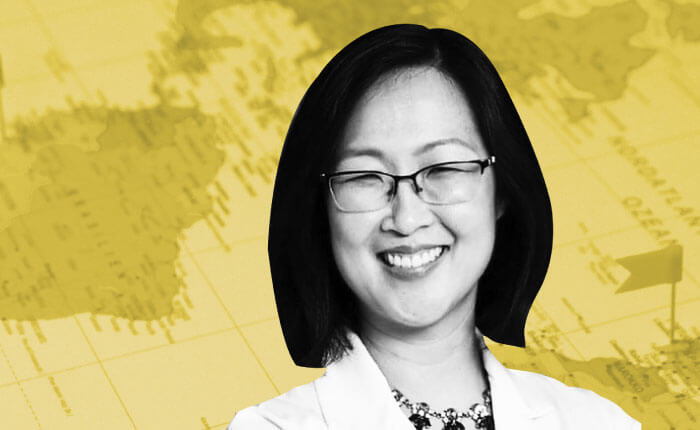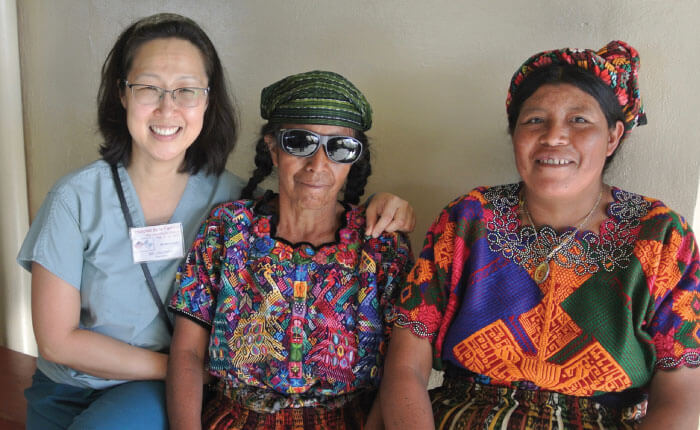
Tell us more about your outreach work…
I’m primarily involved with two mission organizations, Vision Care USA and Hospital de la Familia. Vision Care is an organization that holds about 30 eye camps per year in 38 countries throughout the world. We have fully portable machines, microscopes and supplies that we can set up in any location that has access to electricity and running water. I work primarily in Africa, teaching phacoemulsification to ophthalmologists in Addis Ababa, Ethiopia and working with the Ophthalmological Society of Ethiopia to develop sustainable eye care systems.
I also volunteer with an organization called Hospital de la Familia, a foundation in California that has built a hospital in Nuevo Progreso, a small town approximately six hours west of Guatemala City. It is equipped so that multi-specialty teams of US surgeons can visit there regularly to provide much needed care.
In many developing countries it is possible to find ophthalmologists in the capital cities where most doctors tend to work. It is in the outlying and remote areas that there is very little access to specialty healthcare.
What are the barriers to universal eye care?
One of the main issues is that eye care is a low priority within healthcare systems in the developing world where much of the emphasis is on infectious diseases and maternal-fetal health, which is understandable. However, what makes eye care unique is that the overwhelming majority of cases of blindness worldwide are reversible with two relatively simple interventions: glasses and cataract surgery. And what makes cataract surgery unique is that it is a definitive treatment that can be delivered with very short follow-up care. Cataracts do not require ongoing treatment and do not recur! The impact of reversing blindness may not be easily measured in terms of mortality rate, but the restoration of sight has an important economic and social impact not only on individual patients, but also on entire families and communities.
The main barriers to universal eye care aside from the cost to patients are having doctors who are trained and providing them with reliable equipment and ongoing access to supplies. While going to perform surgery is gratifying, working to help local doctors and their staff develop surgical skills and helping them find reliable sources for equipment and supplies is an important part of the work I do.
What skills or traits are needed to work in remote communities?
The most important trait is to be flexible! As ophthalmologists we depend on a great deal of technology, and we become accustomed to certain standards and have expectations of what we need to deliver adequate care. In remote areas you have to be prepared to see patients that you know you could easily treat and think to yourself, “If only I had this piece of equipment, medication etc., I could take care of this.” You cannot get frustrated in these situations, but be prepared to think outside the box, be creative and adjust to the clinical scenario at hand. It can be psychologically exhausting, but also amazingly rewarding when things turn out better than you imagine!
What about cultural differences?
We have to understand that what we may believe is good for a patient is not necessarily what they need – and that takes times to learn. I go to the same locations over and over again to try to understand how I can be most helpful. It also helps me develop relationships, which are critically important in this line of work, because we have to build trust in communities to deliver care effectively.
Have you learned any skills you can apply to your everyday practice?
In the US we’re accustomed to making everything very streamlined, efficient and uniform, but that’s not what it’s like out in the field. I’ve gained the ability to modify my surgical technique for a wide range of clinical scenarios that we don’t commonly see in the US. For example, phaco machines in the field are nothing like the machines that we are accustomed to in the US, so understanding the subtleties of machine settings has helped me tremendously and made me more efficient when I get back home. It also goes without saying that when you are in a country where you don’t speak the language and whose lifestyle is very different from yours, you must develop the skill to quickly gather clues to assess a patient’s visual needs, which is also helpful in my own practice.
Any special cases you can share?
We saw a young boy – 13 or 14 years old – who was blind and disfigured after a penetrating eye injury. As a result, he was ostracized by his community. Our oculoplastic surgeon performed surgery and much to our amazement found an appropriately sized prosthetic shell, making the disfigurement almost unnoticeable. When he came to the clinic for his postop visit, we were so busy looking at this boy (and admiring our own work), we almost didn’t realize that his mother was on the side crying at seeing her son’s new appearance for the first time. It was very emotional, but that’s the kind of thing we see again and again.
Any advice to potential volunteers?
To anybody thinking about going: take the plunge. World blindness is curable; we have the means, we just need to put the resources in place. It almost doesn’t matter where you go or who you go with, just go – as a community, we can do so much.

